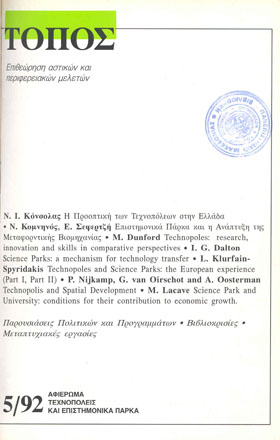Science park and universities: conditions for their contribution to economic growth
DOI:
https://doi.org/10.26266/jtovol5pp107-116Keywords:
Science parks, Universities, Economic growthAbstract
There is a tendency today to consider intellectual power as the main resource for economic development. This statement takes its shape in the interrelation between the University and the industry; this interrelation materialises the best via the concept of Science Parks (S.P.). This trend of establishing S.Ps particularly took off during the post 1980 period. Important factors towards this development have been: a) the post oil-crisis industrialisation, b) the accelerating dependence of the productive sectors of the economy upon Research and Development, and c) the contradiction between the contemporary transnational economies and the Keynesian macroeconomic models. This trend does not only hold for the advanced NAmerica, W.Europe and Japan but also encompasses the new industrialised countries, which however face structural problems in their economies. The strategy of establishing S.Ps has two practical consequences: a) the confirmation of the role of the national governments, and b) the confirmation of the concept of S.Ps as constituiting elements of a new regional and national policy. In the latter direction, five elements become crucial: a) the strengthening of international scientific cooperation, the ecouragement of Technology Transfer, c) the development of a pedagogy of entrepreneurship, d) the creation and maintenace of networks, and e) the provision of high quality office and industrial spaces.Downloads
Published
1992-10-16
Issue
Section
Articles

